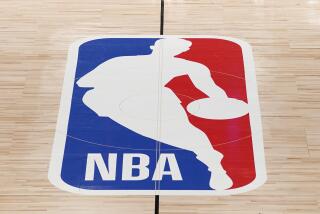NBA cancels November games when labor talks hit same wall
- Share via
So much for optimism. And momentum. And any other positive sentiment that was scooped up and embraced Wednesday and Thursday.
The NBA lockout continues, with the players and owners unable to reach an accord Friday after about 5 1/2 hours at the negotiating table in New York.
If Friday was make-or-break time, things remained badly broken.
The owners were unwilling to move off a 50-50 split of basketball-related income, irritating the players after progress was made on peripheral issues leading up to Friday’s showdown.
“They got to the place where, again, it was 50-50, take it or leave it,” players’ union executive director Billy Hunter told reporters. “And we just said … we’re going to leave it right here.”
Which leaves everybody where, exactly?
Soon after the meeting the NBA canceled another two weeks of regular-season games, wiping out November entirely, and there were no further meetings scheduled between the sides.
From the excitement of détente to dead silence, just like that.
“It’s not practical, possible or prudent to have a full season … under any circumstances,” NBA Commissioner David Stern said. “And I say that with apologies to the municipalities in which we play our games, to the workers who earn their living in our buildings and from businesses around the buildings.”
The Lakers have now had 14 regular-season games canceled while the Clippers have lost 16 games.
The league lost $200 million when it canceled exhibition games across the league and “several hundred million” by canceling a month of regular-season games, Stern said.
He then suggested the owners’ 50-50 offer would only worsen.
“We’re going to have to recalculate how bad the damage is,” Stern said. “[Our] next offer will reflect the extraordinary losses that are starting to pile up now. And you can assume our offer will change to reflect economic circumstances.”
The NBA season was supposed to start next Tuesday, with most players receiving their first paychecks Nov. 15.
There had been reason for optimism coming into Friday because of movement on numerous peripheral issues for a new collective-bargaining agreement.
The maximum length of a player contract was reduced from six years to five for players re-signing with their own team, and from five years to four for free agents signing with another team. The mid-level exception was decreased from $5.8 million a year to $5 million a year for such players.
And the so-called “Bird rights” were kept mainly intact, allowing a team to re-sign its own free agents for more money than other teams could offer. There would be no rollbacks on current contracts.
The sides also agreed on what the luxury tax would be for free-spending teams, though details weren’t provided.
Then talk turned to the big-ticket item, basketball-related income. The players offered to go down from 52.5% to 52%, but the owners declined, the sides tied up on an $80-million difference. Players received 57% of league revenue last season.
“Billy Hunter said he was not willing to go a penny below 52 [percent], that he had been getting a lot of calls from [sports] agents,” Stern said. “He closed up his book and walked out of the room. And that’s where we are.”
Said Hunter: “We made a lot of concessions but unfortunately, at this time, it’s not enough.”
There were no winners. The 2011-12 NBA season remained on the sideline.
“I would say both sides are very badly damaged,” Stern said. “The amount of dollars lost to the owners is extraordinary and the amount of dollars lost to the players under individual contracts is also extraordinary.”
twitter.com/Mike_Bresnahan
Bresnahan reported from Los Angeles.
More to Read
Go beyond the scoreboard
Get the latest on L.A.'s teams in the daily Sports Report newsletter.
You may occasionally receive promotional content from the Los Angeles Times.











